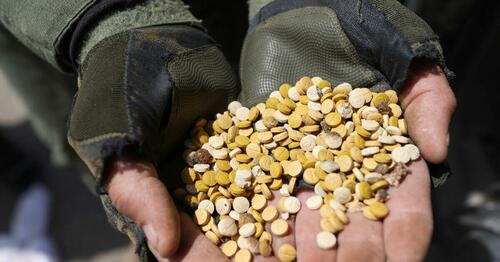Jordan Launches Rare Airstrike On Alleged Syrian Captagon Factory
Previously we described how what’s been dubbed “poor man’s cocaine” at as little as $3 a pill is threatening to proliferate across the Middle East and into Europe. The synthetic stimulant Captagon has been popular for years in parts of the Middle East and North Africa, and was big during ‘Arab Spring’ protests, but mainstream media of late has blamed the Assad government and allied militias for its now rapid spread.
Gulf countries and allies have especially stepped up the pressure on Damascus of late, accusing it of being behind state-backed trafficking which also allegedly involves Lebanese Hezbollah. On Thursday, Jordan appears to have taken the most drastic move yet to tap down on the Captagon trade, sending its air force to bomb an alleged drug factory in southern Syria, in a rare cross-border raid.
The large strike was in the village of Um Rumman, and no casualties were reported, with The Associated Press citing anti-Assad opposition activists to say a Captagon production plant was destroyed.
Syrian state media said that only a farm was blown up, thus denying the allegation it was a drug factory, while others said “the target was also used as a narcotics warehouse where smugglers would prepare and package illegal drugs before smuggling them across the southern border into Jordan.”
The village near where the strike to place is just near the Jordanian border. Apparently drug smugglers have frequently used the area for their drug trade logistics operations.
The Jordanians have seen the southern Syrian region of Sweida as a big problem, particularly ever since the Assad government put down the decade-long rebellion which put the country in the grips of war and instability, as the AP details of a prior incident:
In May, an airstrike over a village in the southern Sweida province killed a well-known Syrian drug kingpin and his family, which activists believe was conducted by the Jordanians. Amman has been concerned by militias’ drug smuggling across the Syrian border into the kingdom, most notably highly addictive Captagon amphetamines, which have turned into an estimated multi-billion-dollar industry in war-torn Syria.
Saudi Arabia and Gulf nations have reportedly been urging President Assad to stem the flow of Captagon from Syria as part of restored diplomatic ties, also at a moment Damascus has been re-embraced by the Arab League.
The drug was produced in the 1960s in the Germany, and in its medical form typically treats ailments like attention deficit disorders and narcolepsy.
It is certainly ironic and dubious that the West now widely blames the Assad government for the proliferation of Captagon, given that for much of the last decade it was anti-government insurgents known to be the heaviest users. At one point the pill even became known as “the drug of jihad”.
Jordan strikes Iran-linked drugs factory in southern Syria | Reuters
📍 Jordan carried out 2 raids on 2 drug sites in southern Syria
📍 The first raid targeted a Captagon factory in Daraa
📍 The 2nd raid killed the most wanted drug smuggler Marai AlRamthan who is closely related… pic.twitter.com/0kF4mfD3KZ— Ayman Abdel Nour (@aabnour) May 8, 2023
Reuters has previously detailed, “It was discontinued but an illicit version of the drug continued to be produced in eastern Europe and later in the Arab region, becoming prominent in the conflict that erupted in Syria following anti-government protests in 2011.”
The same report noted its prominence on the anti-Assad or “rebel” side. “The illicit version – also nicknamed ‘the drug of jihad’ or ‘poor man’s cocaine’ – is thought to be made of a mix of fenethylline, caffeine and other fillers. It generates focus and staves off sleep and hunger,” Reuters wrote. But now blame and pressure has been ramped up on the Syrians, as well as ‘pro-Iranian’ groups including Hezbollah.
Tyler Durden
Thu, 08/31/2023 – 23:20
via ZeroHedge News https://ift.tt/DMq2jVn Tyler Durden
